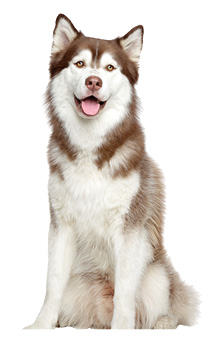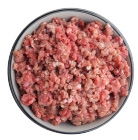Why should you feed your dog or cat raw food?
 At All The Best, we believe that animals thrive on a diet that mimics what Mother Nature would provide them in the wild. Although dogs and cats have been domesticated for thousands of years, it is only in the last century that commercially processed dry and canned foods have become the standard.
At All The Best, we believe that animals thrive on a diet that mimics what Mother Nature would provide them in the wild. Although dogs and cats have been domesticated for thousands of years, it is only in the last century that commercially processed dry and canned foods have become the standard.
Before that, our companion dogs ate a diet composed largely of live prey and scavenged meals, along with scraps from their caretakers’ diets—whole meats, fruits, vegetables, and grains. Cats have historically consumed mainly prey they have caught, providing pest control for their human companions, in addition to occasional scraps of meat. These types of diets are still what our pets’ bodies are adapted to process, as it takes millions of years for significant evolutionary changes in digestive processes to take place. Essentially, dogs, whether they are Chihuahuas or Huskies, are more than 99% identical to a wolf on the inside, and our domestic cats are equally identical to wild cats!
 Because raw diets are not cooked and are minimally processed, the ingredients are easily digested and more bioavailable. Raw pet foods are generally composed of raw muscle meat, organ meat and bones, and fresh whole fruits and vegetables.
Because raw diets are not cooked and are minimally processed, the ingredients are easily digested and more bioavailable. Raw pet foods are generally composed of raw muscle meat, organ meat and bones, and fresh whole fruits and vegetables.
Raw diets are naturally low in carbohydrates and are high in moisture, which benefits pets with an array of health issues. Meals more closely approximating the diet of a wolf or wild cat help ensure that our pets are getting a species-appropriate diet that will support a long life in good health.
PRE-MADE RAW DIETS
• Easiest to prepare—simply thaw chubs, patties, or nuggets, and serve
• Complete and balanced with a full spectrum of vitamins, minerals and trace nutrients that meet AAFCO minimum nutrient levels
• Come in a wide variety of brands with many unique protein sources
HOMEMADE RAW DIETS
• Can be made in bulk quantities for large or multiple pets
• Independently sourced ingredients can be more cost- effective
• Complete control over what goes in—great for animals with allergies and special dietary needs
• Should be fed rotationally, and may require multiple supplements such as kelp and fatty acids to reach optimum nutrient levels
• Needs a calcium component to provide necessary support for strong bones
• Try a chub or our ROAR grinds for an easy base

